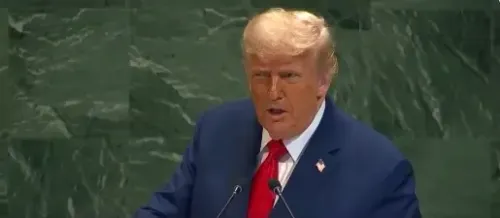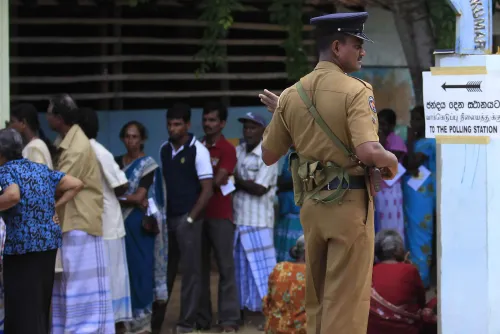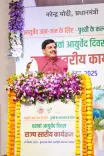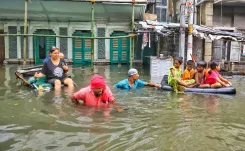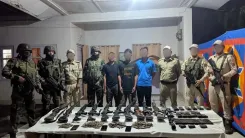What Are the Human Rights Violations Against Pashtuns in Pakistan?
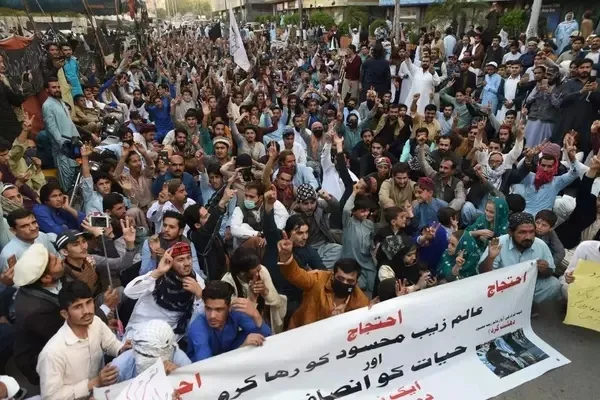
Synopsis
Key Takeaways
- Human Rights Violations: Systematic abuses against Pashtuns include enforced disappearances and targeted killings.
- International Awareness: Protests aim to garner global attention to these issues.
- Repression: The Pakistani government continues to suppress peaceful activism.
- Drone Attacks: Increasing use of drone strikes is raising concerns.
- Community Impact: The situation is leading to deep distrust among Pashtun communities.
Washington, Sep 23 (NationPress) A recent protest at the Broken Chair Square outside the United Nations in Geneva has once again drawn attention to the severe human rights violations faced by the Pashtun community at the hands of the Pakistani government and military forces. The demonstration aimed to honor those who have suffered and endured the trauma stemming from systematic human rights abuses in Pakistan, with a specific focus on the targeted killings, which are increasingly carried out via drone strikes, according to reports.
Organized by the Afghanischer Kulturverein Larawbar EV Germany and the Pashtun Tahafuz Movement (PTM), the event brought together human rights advocates, community representatives, and members of the Pashtun diaspora, as reported by PJ Media. Participants expressed their aspirations for the protest to elevate international awareness concerning the ongoing repression and human rights violations affecting the Pashtun community in Pakistan.
The Pashtun ethnic group in Pakistan is subjected to a vicious and systematic campaign of human rights abuses, which includes widespread enforced disappearances and extrajudicial killings.
“Thousands of Pashtuns have gone missing without a trace after being abducted by security forces, while numerous others have fallen victim to extrajudicial killings. Recently, security forces have escalated their targeting of civilians using drones in the Khyber Pakhtunkhwa region,” the report indicated.
“In Pakistan’s Pashtun belt (comprising the merged tribal districts of Khyber Pakhtunkhwa and surrounding areas), violence and emergency-style policing have solidified into a pattern of control that perceives entire communities as threats. Rights organizations, UN bodies, and international media have documented practices of enforced disappearances, arbitrary detention, excessive force during security operations, and the criminalization of peaceful activism,” it stated.
According to the report, Amnesty International’s South Asia portal has recorded at least 10,078 cases with Pakistan’s Commission of Inquiry on Enforced Disappearances since 2011, including 3,485 from Khyber Pakhtunkhwa and 2,752 from Balochistan, the two provinces with significant Pashtun populations. Amnesty noted that many cases go unreported, with temporary abductions followed by release or fabricated prosecutions used to silence dissenters.
The report highlighted that, “In April–May 2025, the UN Working Group on Enforced or Involuntary Disappearances took the unusual step of issuing a general allegation against Pakistan during its 136th session, emphasizing rising concerns about impunity. Meanwhile, crackdowns on Pashtun civic mobilization have intensified. In October 2024, authorities banned the Pashtun Tahafuz Movement (PTM) under anti-terrorism laws, branding a largely peaceful civil rights platform as a security threat. Amnesty International condemned this as an affront to freedom of association and called for its revocation.”
Security operations have continued to escalate in Pakistan's Pashtun regions under the guise of renewed counterinsurgency. In 2024, Pakistan initiated 'Azm-e-Istehkam' amidst rising militant attacks.
“Independent reports have raised concerns about whether new sweeps will repeat previous patterns that punish communities without addressing the insurgency. By mid-2025, UNICEF’s humanitarian updates described intelligence-based operations in the Kurram district (KP), resulting in short-term displacement of residents and returns marked by deep-seated distrust,” the PJ Media report emphasized.

